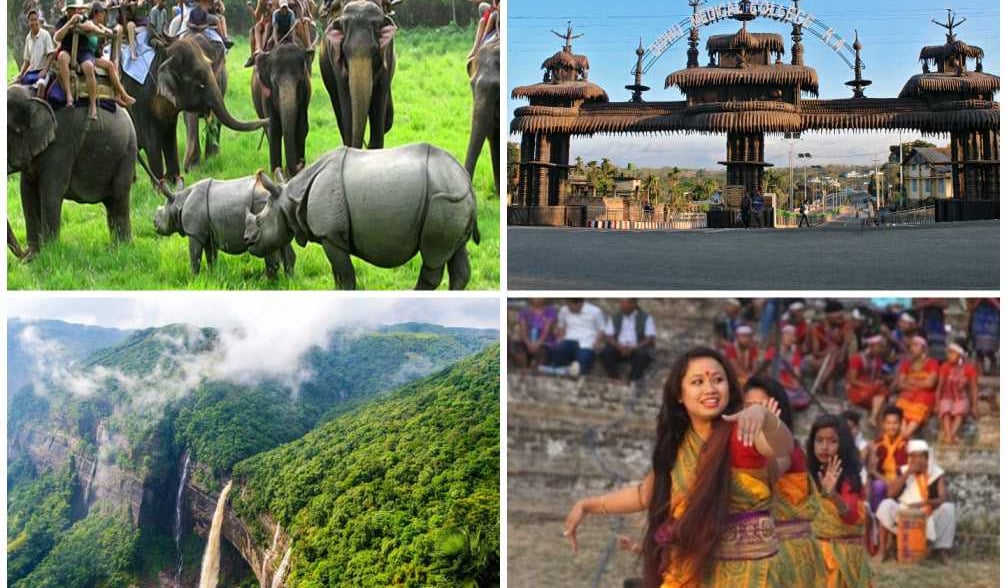Tucked away in the scenic hills and lush greenery of Assam, Diphu serves as the administrative heart of the Karbi Anglong district. Unlike the usual crowded tourist spots, Diphu promises a serene retreat filled with rich cultural heritage and a deep bond with nature. For travelers seeking an authentic and peaceful escape in Northeast India, Diphu is a hidden treasure just waiting to be discovered.
Location & Best Timing to Visit
Location: Diphu is situated in the central part of Assam, within the Karbi Anglong Autonomous Council region. It's surrounded by rolling hills and lush greenery, characteristic of the state's diverse topography.
Best Time to Visit: The ideal time to visit Diphu is during the winter months, from October to March. During this period, the weather is pleasantly cool and dry, with temperatures ranging from 10°C to 25°C. This makes it perfect for sightseeing and outdoor activities. The monsoon (June to September) brings heavy rainfall, which can sometimes disrupt travel plans, while summers (April to May) can be warm and humid.
Places to Visit in & Around Diphu
While Diphu itself offers a serene atmosphere, its charm lies in its local culture and the natural beauty of its surroundings.
Karbi Cultural Society (KCS) Complex, Taralangso:
Description: This is the heart of Karbi culture. The complex often hosts cultural programs, research activities, and traditional events. It's a great place to understand the rich heritage of the Karbi people through their music, dance, and crafts.
Timing: Generally open during daytime hours, roughly 10:00 AM to 5:00 PM. It's advisable to check for specific event timings if you wish to witness a performance.
Singhason Peak:
Description: The highest peak in the Karbi Anglong district, offering breathtaking panoramic views of the surrounding hills and valleys. It's a popular spot for trekkers and nature enthusiasts. The journey to the top is rewarding, with opportunities for birdwatching and photography.
Timing: Best visited during daylight hours, especially mornings for clear views. The trek can take a few hours, so plan accordingly to return before dusk.
District Museum:
Description: A modest but insightful museum that houses artifacts, traditional tools, textiles, and historical records related to the Karbi Anglong district and its indigenous communities. It's a good place to gain a deeper understanding of the local history and anthropology.
Timing: Typically, open from 10:00 AM to 4:00 PM on weekdays, closed on public holidays.
Arunachal Pradesh Circuit House Viewpoint (near Diphu):
Description: Though part of Arunachal Pradesh, this viewpoint is relatively close to Diphu and offers stunning vistas of the landscape, especially at sunrise or sunset.
Timing: Accessible throughout the day, but mornings and late afternoons are recommended for the best light.
Local Markets:
Description: Explore the vibrant local markets in Diphu to witness daily life and find traditional Karbi handicrafts, handloom products, local produce, and fresh spices. It’s a great way to interact with the locals and soak in the regional flavor.
Timing: Active from morning till late afternoon, usually from 9:00 AM to 6:00 PM.
Connectivity to Diphu
Diphu is reasonably well-connected, making it accessible for travelers.
By Rail:
Diphu Railway Station (DPU): This is a key railway station on the Lumding-Dibrugarh section of the Northeast Frontier Railway. Numerous trains connect Diphu to major cities like Guwahati, Kolkata, Delhi, and Dibrugarh.
Travel Time: From Guwahati, it takes approximately 5-6 hours by train.
By Road:
Diphu is connected by national highways (NH-29 and others) to major towns and cities in Assam and neighboring states.
Bus Services: Regular bus services operate from Guwahati, Nagaon, Jorhat, and other parts of Assam to Diphu.
Private Cabs: Taxis and private cars can also be hired from Guwahati or nearby towns.
Travel Time: From Guwahati, the road journey takes approximately 6-7 hours, depending on traffic and road conditions.
By Air:
The nearest major airport is Dimapur Airport (DMU) in Nagaland, which is about 55-60 km from Diphu. It has flights connecting to major Indian cities like Kolkata, Delhi, and Guwahati.
Another significant airport is Lokpriya Gopinath Bordoloi International Airport (GAU) in Guwahati, which is about 220 km from Diphu. This airport offers broader connectivity across India.
From Dimapur Airport, you can hire a taxi or take a bus to reach Diphu (approx. 1.5-2 hours’ drive). From Guwahati Airport, you would typically take a train or bus to Diphu.
Other Relevant Information for Travelers
Accommodation: Diphu offers a range of accommodation options, from budget-friendly guesthouses and lodges to a few mid-range hotels. Most are centrally located, providing easy access to the town's amenities. It's advisable to book in advance, especially during peak season or if you're attending specific events.
Local Cuisine: Dive into the unique flavors of Karbi cuisine! Expect dishes rich in local herbs, bamboo shoot, and traditional fermentation techniques. Pork and chicken preparations are common, often cooked with minimal oil and maximum flavor. Don't miss trying "hor-alang" (rice beer) if you get the chance, a traditional beverage.
Local Transportation: Within Diphu town, you can easily get around using auto-rickshaws, shared jeeps, or cycle rickshaws for shorter distances. For exploring areas outside the main town, hiring a private taxi or jeep for the day is recommended.
People and Language: The predominant community in Diphu is the Karbi tribe, and the primary language spoken is Karbi. Assamese and Hindi are also widely understood, especially in commercial areas and by younger generations. The Karbi people are known for their hospitality and warmth.
Festivals: If your visit aligns with major Karbi festivals, you're in for a treat.
Rongker: An annual festival celebrated in January to appease deities for the well-being of the village and good harvest.
Chomangkan (also known as "Thi-karhi"): The most important and elaborate post-funeral ceremony of the Karbis, typically spanning several days. While not a regular tourist event, its cultural significance is immense.
Tips for Travelers:
Respect Local Culture: The Karbi people have strong cultural traditions. Dress modestly, especially when visiting religious sites or participating in cultural events.
Photography: Always ask for permission before photographing people, particularly in rural areas or during private ceremonies.
Stay Hydrated: Even in winter, carry water, especially if you plan to trek or spend extended time outdoors.
Connectivity: While Diphu has decent mobile network coverage, it might be spotty in remote areas.
Cash: While digital payments are gaining traction, carrying sufficient cash is always advisable, especially for smaller local shops and transport.
A Peaceful Retreat Awaits
Diphu might not boast grand monuments or bustling nightlife, but its charm lies in its serene environment, the warmth of the Karbi people, and the simple beauty of its surroundings. It's a place where you can unwind, connect with nature, and gain a deeper appreciation for the rich cultural tapestry of Northeast India. So, pack your bags and discover the quiet allure of Diphu.
Read also: Top 10 Places in Assam


